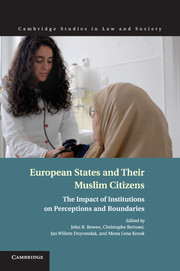Crossref Citations
This Book has been
cited by the following publications. This list is generated based on data provided by Crossref.
2015.
Lost in China?.
p.
269.
2015.
Opposing the Rule of Law.
p.
318.
Michalowski, Ines
2015.
What is at stake when Muslims join the ranks? An international comparison of military chaplaincy.
Religion, State and Society,
Vol. 43,
Issue. 1,
p.
41.
Jensen, Sidsel Vive
2016.
Institutional Governance of Minority Religious Practices: Insights from a Study of Muslim Practices in Danish Schools.
Journal of Ethnic and Migration Studies,
Vol. 42,
Issue. 3,
p.
418.
2016.
Criminal Defense in China.
p.
201.
Alyanak, Oguz
2016.
Do Your Best and Allah Will Take Care of the Rest: Muslim Turks Negotiate Halal in Strasbourg.
International Review of Social Research,
Vol. 6,
Issue. 1,
p.
15.
2016.
A Sociology of Transnational Constitutions.
p.
521.
2017.
Duties to Care.
p.
259.
Joly, Danièle
2017.
Muslim Women’s Political Engagement in British and French Society.
Revue européenne des migrations internationales,
Vol. 33,
Issue. 2-3,
p.
157.
2017.
The Politics of Bureaucratic Corruption in Post-Transitional Eastern Europe.
p.
215.
Kurth, Laura
and
Glasbergen, Pieter
2017.
The influence of populism on tolerance: a thematic content analysis of the Dutch Islam debate.
Culture and Religion,
Vol. 18,
Issue. 3,
p.
212.
2018.
Children as ‘Risk'.
p.
357.
Joly, Danièle
and
Wadia, Khursheed
2018.
L’activisme des femmes issues de communautés musulmanes en France et en Grande-Bretagne.
Socio,
p.
25.
Harms-Dalibon, Lisa
2018.
Céline Béraud, Claire de Galembert et Corinne Rostaing, De la religion en prison.
Sociologie du travail,
Vol. 60,
Issue. 1,
2019.
Genocide Never Sleeps.
p.
219.
de Galembert, Claire
2019.
Avant-propos.
Sociologies pratiques,
Vol. N° 39,
Issue. 2,
p.
1.
Astor, Avi
Griera, Mar
and
Cornejo, Mónica
2019.
Religious governance in the Spanish city: hands-on versus hands-off approaches to accommodating religious diversity in Barcelona and Madrid.
Religion, State and Society,
Vol. 47,
Issue. 4-5,
p.
390.
Walton, Jeremy F.
and
Rexhepi, Piro
2019.
On Institutional Pluralization and the Political Genealogies of Post-Yugoslav Islam.
Religion and Society,
Vol. 10,
Issue. 1,
p.
151.
2020.
Transnational Legal Ordering of Criminal Justice.
p.
386.
Henry, Edward R.
Mickelson, Andrew M.
and
Mickelson, Michael E.
2020.
Documenting Ceremonial Situations and Institutional Change at Middle Woodland Geometric Enclosures in Central Kentucky.
Midcontinental Journal of Archaeology,
Vol. 45,
Issue. 3,
p.
203.



